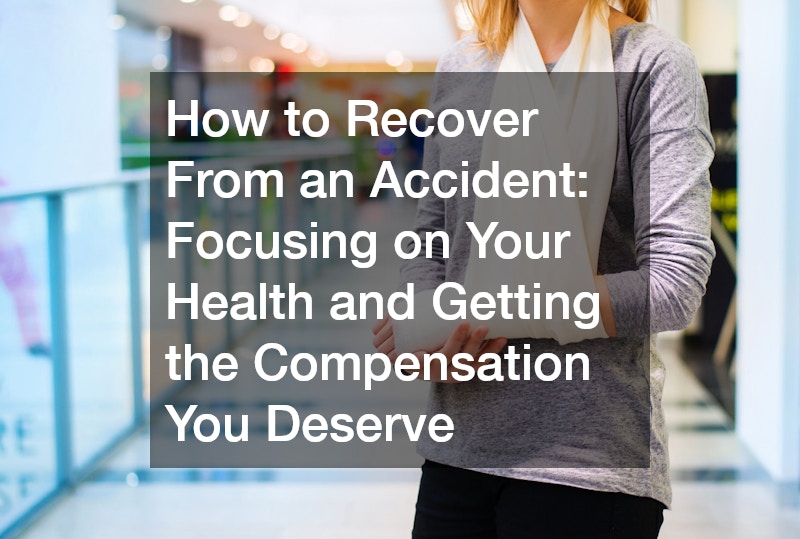
Wondering how to recover from an accident? It can be an overwhelming experience, involving both physical healing and legal processes. Understanding the path to effective recovery is crucial for your well-being and securing any compensation you deserve. This article will guide you through the necessary steps, addressing both health recovery aspects and the legal procedures involved in filing a successful compensation claim.

Immediate Steps to Take After an Accident
When an accident occurs, taking immediate action is vital to ensure your health and legal standing are both protected. The first step you should take is to seek medical attention, even if you feel fine, as some injuries might not be immediately apparent. Additionally, a personal injury lawyer can guide you on how to recover from an accident by helping you seek compensation for damages..
Documenting the accident scene, collecting witness statements, and obtaining a police report can also strengthen your case when seeking compensation later. These records will provide foundational evidence your injury lawyer can use to substantiate your claim. It’s crucial to remember that your immediate post-accident actions can significantly influence your recovery timeline and legal position.
Finally, understanding the role of insurance during this phase can make a substantial impact. An injury lawyer can assist you in dealing with insurance companies, avoiding common pitfalls, and ensuring that your rights are protected. Each of these immediate steps serves to support both your physical well-being and your pursuit of rightful compensation.
How to Handle Medical Care After an Accident
Understanding how to recover from an accident can help you regain strength and confidence in your daily life. Medical care is a critical component of recovery after an accident. It’s essential to begin with a comprehensive evaluation by a doctor to diagnose injuries accurately. Collaboration with a physical therapist might follow, focusing on rebuilding strength, mobility, and overall function.
The role of a physical therapist is not only to manage acute injuries but also to prevent long-term complications. Your therapy sessions will be tailored to your specific needs, involving exercises that promote healing and enhance recovery. Partnering with a physical therapist can accelerate your return to normalcy.
Furthermore, consistent follow-up appointments are necessary to monitor progress and make any required adjustments to your treatment plan. These appointments help ensure that any emerging issues are promptly addressed, supporting sustained recovery. Alongside professional care, personal commitment to prescribed home exercises will contribute significantly to your rehabilitation process.
How to Manage Emotional and Psychological Recovery
Accidents can have a profound impact on a person’s emotional and psychological state. If you’re unsure how to recover from an accident, consulting with a physical therapist can be a great first step. Engaging in rehabilitation therapy is essential for addressing emotional trauma, anxiety, or depression that may arise post-accident. This therapy can be complemented by non medication treatment for depression, such as mindfulness and cognitive behavioral techniques.
Regular sessions with a counselor or psychologist can provide a safe space to process the trauma and develop coping strategies. This support can reduce the long-term psychological impacts and facilitate emotional healing. Participating in group therapy can also be beneficial, providing the chance to share experiences and support from others in similar situations.
Moreover, setting realistic wellness goals can help focus recovery efforts and maintain a positive outlook. These goals can align with broader health objectives such as improved physical fitness, stress management, and a balanced lifestyle. Keeping a journal or engaging in creative outlets can also play a role in supporting emotional health during recovery.

Why Depression Is Common During Accident Recovery
Many online resources provide guidance on how to recover from an accident, including tips for seeking professional mental health help. Depression is a frequent concern during this time for several reasons. Here’s why:
- Physical Pain and Limitations: Accidents often leave individuals with injuries that restrict their ability to move or perform daily tasks. Prolonged pain or immobility can lead to frustration, feelings of helplessness, and eventually depression.
- Loss of Independence: Relying on others for basic needs can be emotionally taxing. Losing the ability to drive, work, or care for oneself can create feelings of inadequacy and sadness.
- Financial Stress: Medical bills, lost wages, and other expenses can lead to overwhelming financial stress. This worry often compounds emotional strain, making recovery feel more daunting.
- Changes in Lifestyle and Identity: An accident can alter someone’s life permanently, whether due to long-term physical disabilities or changes in career paths. Adapting to these changes can bring about grief and a loss of identity, both of which are closely linked to depression.
- Isolation and Social Withdrawal: Recovery often requires extended periods of rest, limiting social interaction. This isolation can intensify feelings of loneliness and exacerbate depressive symptoms.
- How to Cope: Support from family, friends, or professional counseling can significantly help. Recognizing the emotional challenges of recovery is a crucial step toward addressing depression and fostering mental well-being.
Impact of Anxiety During Accident Recovery
Accident recovery is often not only a physical challenge but also an emotional one. Anxiety is a common emotional response during this process, and it can have significant effects on both physical and mental well-being. Here’s how:
- Increased Stress and Tension: Anxiety can cause heightened stress levels, which may exacerbate physical pain. The body’s natural response to anxiety includes muscle tension and increased heart rate, which can interfere with healing and prolong recovery.
- Disrupted Sleep Patterns: Anxiety often leads to sleep disturbances, such as insomnia or restless sleep. Rest is essential for healing, so lack of quality sleep can hinder recovery and make anxiety worse, creating a vicious cycle. Your doctor can give you specific advice on how to recover from an accident tailored to your injuries and sleep problems.
- Decreased Motivation to Participate in Therapy: Those recovering from an accident often undergo physical therapy and rehabilitation. Anxiety can make individuals fearful of pain or re-injury, leading to avoidance of these activities, which ultimately slows down the recovery process.
- Impact on Relationships: The emotional strain caused by anxiety can put a strain on relationships with family, friends, and caregivers. Anxiety may make individuals more irritable, withdrawn, or less communicative, which can create tension and increase feelings of isolation.
- Long-Term Mental Health Effects: If not addressed, anxiety can contribute to more severe mental health issues, such as depression or post-traumatic stress disorder (PTSD). These conditions may become harder to manage as time goes on, making the overall recovery process more difficult.
Legal Steps to Take After an Accident
Knowing how to recover from an accident legally often involves understanding your rights and filing the necessary claims. Consulting with injury attorneys is a prudent first step to clarify your legal rights and options. These professionals specialize in navigating complex liability law, ensuring that your case is handled correctly and efficiently.
Injury attorneys will begin gathering further evidence, analyzing medical records, and assessing the details surrounding your accident to build a compelling case. Their expertise can be invaluable in negotiating with insurance companies and representing your interests, should the case progress to court. Having a reputable attorney on your side can help relieve some of the burdens during this challenging time.
Furthermore, legal proceedings can be lengthy, involving precise documentation, adherence to deadlines, and potentially complex negotiations. Consulting an attorney can clarify how to recover from an accident and navigate insurance disputes effectively. Your legal team will guide you through each step, maximizing the likelihood of a favorable outcome. Trusting their knowledge and experience will better position you to receive the compensation you deserve.

File an Insurance Claim Successfully
Filing an insurance claim is a key aspect of post-accident recovery. Understanding the specific requirements and necessary documentation will streamline the process and reduce delays. An accident injury attorney can guide you through the procedure, from initial claim submission to final settlement negotiations.
Keeping detailed records of medical expenses, treatment progress, and any loss of income due to the accident is essential. These documents will serve as evidence to support your claim and illustrate the full extent of your damages. The more thorough your documentation, the better prepared you are to justify the compensation you seek.
Maintaining communication with your insurance company is also crucial. Promptly responding to requests for additional information and regularly checking the status of your claim can prevent unnecessary complications. An experienced attorney working on your behalf can provide reassurance that all aspects of your claim are managed effectively, ensuring the pursuit of your rightful compensation.
Calculate and Prove Damages
Calculating and proving damages is a fundamental component of securing fair compensation. This process involves assessing both the immediate and long-term impacts of the accident on your life. Working with injury attorneys can help you accurately quantify the financial, physical, and emotional toll of your injuries.
From medical bills and rehabilitation therapy costs to lost wages and diminished earning capacity, each element must be thoroughly documented and presented. Local rehab therapy plays a vital role, as its costs and benefits can be included in your claim. Comprehensive evidence will lend credibility and persuasiveness to your case.
Your attorney will also consider non-economic damages such as pain and suffering, emotional distress, and loss of enjoyment of life. Establishing these damages requires a nuanced understanding of liability law and expert testimonies, which an attorney can help organize. Together, these efforts support a comprehensive claim that accurately reflects the full scope of your loss.
Common Challenges in the Recovery Process
Recovering from an accident is often fraught with challenges, both physical and legal. Physically, setting and achieving wellness goals can be difficult without adequate support and resources. Rehabilitation therapy, facilitated by a local rehab therapist, is essential for overcoming physical obstacles and regaining function.
Emotionally, the process can be taxing, necessitating both individual resilience and external support. Psychological barriers can impede progress if left unaddressed, highlighting the importance of comprehensive recovery strategies. Solutions include dedicated therapy sessions, non medication treatment for depression, and the establishment of a strong support system.
On the legal front, navigating insurance claims and understanding liability law can be overwhelming. Legal professionals can provide insight on how to recover from an accident by pursuing a settlement or taking your case to court. An injury lawyer will ensure that claims are handled correctly and efficiently. Their expertise allows you to focus on healing while they manage the intricate legal procedures on your behalf.

How the Legal System Impacts Your Recovery
Understanding how to recover from an accident includes knowing when to gather evidence and contact a lawyer for legal advice. However, it’s also important to know how the legal system can significantly influence your recovery journey, affecting both the timeline and outcome of your compensation claim. Understanding liability law is key to ensuring your case is presented effectively and accurately. An injury lawyer can elucidate this complex area, ensuring you know your rights and possibilities.
Delays or complications in legal proceedings can place additional stress on your recovery, potentially prolonging your path to normalcy. By engaging with experienced injury attorneys, you can mitigate these issues and proceed with confidence. Their role is to streamline the process and tackle any legal hurdles that may arise.
Ultimately, the legal landscape plays a crucial role in determining the resources available for your recovery. Securing appropriate compensation can afford you the necessary care and support to aid in your rehabilitation efforts. It also provides peace of mind, allowing you to focus more effectively on physical and emotional healing without undue financial strain.
Support Long-Term Recovery and Well-Being
Long-term recovery requires a holistic approach, incorporating physical therapy, emotional support, and lifestyle adjustments. Partnering with a local rehab therapist can ensure that you continue to progress in regaining strength and mobility. Consistent and personalized rehabilitation therapy fosters sustained improvements and prevents potential setbacks.
Additionally, achieving wellness goals beyond initial recovery can enhance overall well-being and quality of life. Setting realistic targets for physical fitness, mental health, and lifestyle changes can offer motivation and direction. Embracing non medication treatment for depression, such as mindfulness practices, contributes to long-term emotional resilience.
Finally, maintaining a support network is paramount. This network may include healthcare professionals, family, and friends, all of whom can provide encouragement and assistance. Recognizing the journey of recovery as a marathon rather than a sprint allows for balanced progress and eventual triumph over the challenges of accident recovery.
Benefits of a Successful Compensation Claim
A successful compensation claim can have far-reaching benefits for your recovery and future. Financial compensation allows you to access necessary medical treatments, cover out-of-pocket expenses, and replace lost income. With the help of an accident injury attorney, you can ensure that your claim accurately reflects these needs.
Beyond financial relief, achieving a compensation claim validates your experience and the hardships faced. It can provide closure, affirming that justice has been served. An effective partnership with experienced injury attorneys ensures that your voice is heard and rights are protected throughout the process.
Moreover, compensation can enable long-term planning for continued recovery and personal development. It offers the opportunity to invest in future health initiatives, fulfilling wellness goals, and securing a better quality of life. Overall, the rewards of a successful claim extend beyond immediate needs, fostering a more secure and hopeful future.
When you’re wondering how to recover from an accident, it’s crucial to understand these physical, emotional, and legal strategies. Embracing these tips will pave the way towards a fulfilling recovery, ultimately enhancing your well-being and quality of life post-accident.



